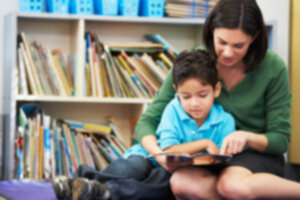 Do Picture Books Foster Better Language Skills than Electronic Books?
Do Picture Books Foster Better Language Skills than Electronic Books?

Technology has been around long enough for many experts to now be able to state, unequivocally, that picture books foster better language skills than electronic books. The white paper “The Power of Pictures” states that kids intuitively grasp the meaning of pictures long before they’re taught how to read actual words. Essentially, picture books provide a platform in which pictures and text come together.
According to the white paper, a picture book is defined as a book where the pictures are just as important as the text. The illustrations and text are essentially one and provide more together than they can alone, it says.
A journal article on the emergent literacy of children says that research shows that parental involvement is often not as high with electronic books, especially those with lots of interactive features. It added that parents sometimes feel frustrated when trying to read enhanced stories with their kids and that takes away from being able to delve deeper into the storyline. The journal “Mind, Brain and Education,” says additional studies also indicated that comprehension and reading were both negatively affected by the presence of electronic features when parents read with their kids. As such, publishers throughout the world are cognizant of the shift towards digitized reading in the early grades and are looking into more creative ways of using electronic books, so that it doesn’t take away from young readers, said the journal.
Staying with the tried-and-true picture books for teaching literacy, one program that’s making a big and positive difference across the country is The Latino Family Literacy Project. It’s a terrific program for all ages of the Hispanic student population and helps parents to instill the love of reading with their kids by establishing an at-home reading routine. For babies through the young grade-schooler, the program uses colorful, bilingual, picture books to make reading come alive. Along with helping families, it’s a win-win for schools too, as it helps to turn out successful readers and improve testing scores. Educators can either participate in an online webinar or complete a program training workshop in their area.
